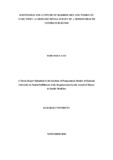KNOWLEDGE AND ATTITUDE OF MARRIED MEN AND WOMEN ON VASECTOMY: A CROSS-SECTIONAL SURVEY OF A MISSION HEALTH CENTRE IN BURUNDI
Abstract
Vasectomy is a safe, cheap, easy to perform a method of contraception. However, its uptake in Burundi is low. Moreover, matters of family planning are packaged as a female responsibility than male, and it is not clear what attitude and knowledge married men and women have towards vasectomy. The objective of this study was to assess the knowledge and attitude of married men and women towards vasectomy as well as demographic factors that influence vasectomy uptake. A cross-sectional survey design was carried out utilizing a questionnaire. Stratified and simple random sampling was used. The sample size consisted of 234 respondents, with 142 male respondents and 92 female respondents. Descriptive statistics, independent T-test and chi square for assessing association between variables using SPSS version 17 were used for data analysis. This study found that 51.2% of respondents had good knowledge about vasectomy. Knowledge did not correlate with acceptance of vasectomy: 92.6% of respondents with good knowledge, 96.2% of those with fair knowledge and 92.9% of those with poor knowledge did not accept vasectomy (P=0.787). In terms of attitude, the overall attitude Mean score was 47.1% signifying a negative attitude towards vasectomy. 95.6% of respondents agreed that vasectomy was not acceptable in the Burundian culture, and 90.1% of respondents stated that vasectomy was against their religious belief. 80% of respondents also agreed that there is not enough information available on vasectomy, 90.5% agreed that the irreversibility of vasectomy constituted a reason for not adopting it. In terms of acceptance of vasectomy, the study found that the majority of respondents was not willing to accept vasectomy: 91.6% of male respondents and 95.7% of female respondents. A significant association was noted between vasectomy acceptance and age (P=0.029) and the number of current children (P=0.012). No other significant association was noted with other socio demographic factors. Overall knowledge of married men and women about vasectomy was acceptable (52.1%), attitude towards vasectomy was poor, and acceptance was low. Myths and misconception about vasectomy were noted. There is a need for greater awareness of vasectomy knowledge as a potential vehicle to affect attitude change towards vasectomy.

